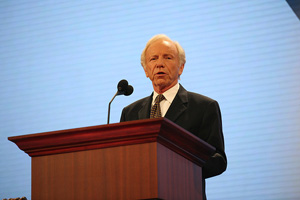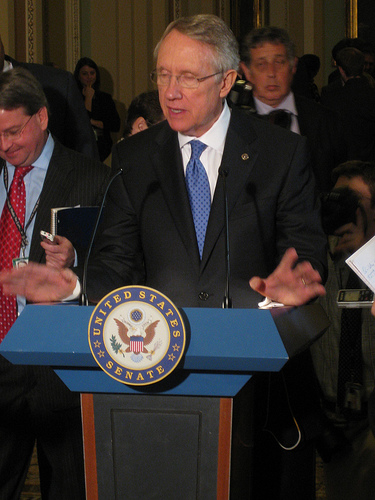
Photo by the <a href="http://www.flickr.com/photos/newshour/2823165891/">PBS News Hour</a> used under a <a href="http://www.creativecommons.org">CC</a> license.
On Sunday, Sen. Joe Lieberman, the onetime Democrat from Connecticut, vowed to filibuster any health care bill that contains a public option or that offers a Medicare “buy-in” for people under 65. Lieberman’s threat, made to Senate majority leader Harry Reid (D-Nev.) during a closed-door meeting on Capitol Hill, further dims the prospects for health care reform. But in vowing to kill health care reform to block any Medicare expansion, Lieberman has engaged in a dramatic flip-flop.
In 2000, when he was Al Gore’s running mate, Lieberman campaigned on a platform that proposed offering everyone 55 and older an option to buy into Medicare. That proposal—which was a central part of the Gore-Lieberman campaign’s health care plan—essentially would have created a robust public option for people aged 55 to 65. It’s the same proposal that Lieberman now claims is a deal-breaker for him on health care reform.
Asked last month how Lieberman could reconcile his current opposition to a Medicare buy-in with his earlier support for the idea, a spokesperson for the senator said in an emailed statement, “Senator Lieberman is a strong supporter of Medicare and Medicaid and supports efforts to strengthen those programs and to help the millions of Americans who rely on those programs for their health care.” That is, the Lieberman spokesperson refused to explain his switch.
But statements like that one implied that Lieberman might support the Medicare buy-in. So his comments on Sunday caused some critics to accuse Lieberman of “double crossing” Reid. But Lieberman expressed “significant misgivings” about the buy-in to Reid last week, spokesman Marshall Wittman told The New Republic and the New York Times on Sunday.
While Lieberman was always a hawk on foreign policy, Lieberman’s domestic views have become increasingly conservative—especially since the election of Barack Obama. In a few years, he’s gone from being a favorite of groups like the American Public Health Association that back single-payer health care reform, or “Medicare for all,” to opposing the much more limited Medicare buy-in. Why has he changed so much? “For Lieberman, the personal has become political,” Peter Beinart suggested in the Daily Beast last month:
[Lieberman is] bitter. According to former staffers and associates, he was upset by his dismal showing in the 2004 Democratic presidential primary. And he was enraged by the tepid support he got from many party leaders in 2006, when he lost the Democratic primary to an anti-war activist and won reelection as an independent. Gradually, this personal alienation has eaten away at his liberal domestic views. His staff has grown markedly more conservative in recent years, and his closest friends in Congress are now Republicans John McCain and Lindsey Graham.
With Lieberman threatening to deep-six Obama’s top legislative priority, it’s hard to believe that only nine years ago he held second billing on the Democrats’ national ticket. In those days he proudly championed the expansion of government-run health insurance. Now, he’s the scourge of government involvement in health care. Why won’t he explain his shift?
Portions of this post were published in a previous article on Lieberman’s position on Medicare buy-in.










